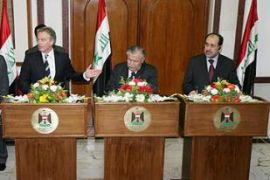Blair defends Saddam’s removal
Iraqi leaders assured of continued British support after UK PM leaves office in June.

Security improving
Lou Fintor, a US embassy spokesman, said the attack on the Green Zone wounded one person.
Security officials, speaking on condition of anonymity, said one round hit the British embassy compound.
It was not known if Blair was in the embassy at the time, but he appeared to refer to the attack during the news conference.
He said: “There are mortar attacks and terrorist attacks happening every day. We don’t give in to them.”
Final visit
Blair, who was on his seventh and final visit to Iraq, said he believed security was improving in Iraq, but acknowledged violence was still a daily occurrence.
| Your Views |
|
“Blair has been made a scapegoat for British foreign policy regarding Iraq” surfdog1958, Baton Rouge, US |
He said: “Iraq was liberated from the terrible dictatorship of Saddam (Hussein) and now there are attempts to oppress it in a different ways with terrorism and violence.”
Blair said he had told al-Maliki and Talabani that Britain would continue to support them after he left office in June.
He urged them to increase efforts to bring tribal leaders and others linked to violence into the political process.
However, he did not win an agreement from the Iraqi leaders to hold new provincial elections.
‘Right direction’
A British spokesman said: “We can’t speak for them, but we are confident they are moving in the right direction on elections.”
Blair had hoped provincial elections could take place in 2007 and that Sunni groups, who boycotted the last similar poll, would field candidates, the spokesman said.
The spokesman said multinational force officials are cautiously optimistic over evidence that some tribal leaders in Anbar province have ousted al-Qaeda-linked fighters hiding in their communities.
He said Britain did not favour talks with foreign terrorists but would support moves to bring those whose violence was motivated by “concerns about whether their community will have a place in the new Iraq” into the political sphere.
Plea to neighbours
Blair said: “The future of Iraq should be determined by Iraqis in accordance with their wishes and it is important that all the neighbouring countries understand and respect that.
“We know it is important to work with Iran but Iran has to understand it cannot support terrorism and want to work with us at the same time.”
In a rare meeting, ambassadors from Iran and the US will meet in Iraq on May 28 to discuss security in the country.
Meanwhile, speaking on the BBC, Jimmy Carter, the former US president, said on Saturday that Blair could have exerted greater influence over Bush, and his government had shown “subservience” towards the White House over Iraq and other foreign policy areas.
He said: “I have been really disappointed in the apparent subservience of the British government’s policies related to many of the serious mistakes that have been originated in Washington.”